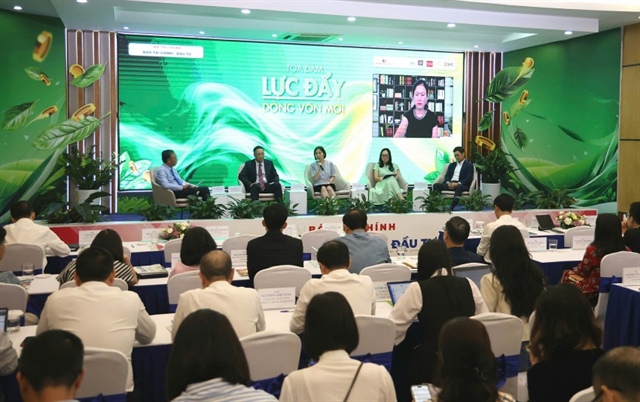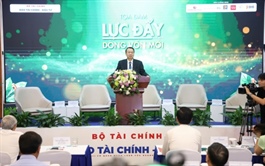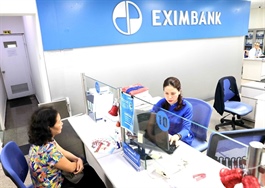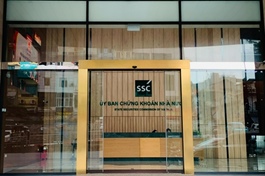Calls grow for reforms to attract long-term capital to Vietnam
Calls grow for reforms to attract long-term capital to Vietnam
Vietnam still holds significant untapped potential for attracting both domestic and foreign capital, but experts say targeted reforms are needed to unlock it.
At a seminar hosted by VIR on July 23, Nguyen Phan Dung, deputy general director of SSI Asset Management, said many large foreign investors are "ready and waiting" to enter the Vietnamese market. He stressed that improving conditions for long-term capital – particularly through tax incentives – could play a key role in deepening the market and drawing in institutional investment.

Insights shared during the discussion session. Photo: Dung Minh |
According to Dung, Vietnam is at a pivotal point where policy reform could significantly unlock long-term capital and draw in greater foreign inflows into the stock market. He emphasised the importance of supporting long-horizon investors through a more favourable tax framework, particularly those allocating capital via professional fund managers.
"Investors adopting a long-term approach through professional fund managers should be granted preferential tax treatment, in line with practices in more mature markets," said Dung. "Such policies not only promote market stability but also support sustainable capital formation."
Dung believes that Vietnam’s traditionally high savings rate, combined with the current low-interest environment, presents a unique opportunity to mobilise idle capital. Ss deposit terms come to an end and interest rates remain compressed, the widening yield gap could, according to Dung, encourage more capital to flow into securities and other investment channels, if the right policy levers are in place.
"Vietnam’s high savings rate and low deposit environment present a golden opportunity to channel idle capital into productive investment," he said. "With the right policies, we can bridge the yield gap and mobilise funds into the financial markets."
Dung also spoke about the ongoing review of tax legislation as a crucial moment to embed mechanisms that favour long-term investment behaviour, saying, "The ongoing tax reform presents a timely chance to integrate incentives that encourage long-term, stable investment behaviours."
Looking ahead, Dung feels that a successful upgrade of Vietnam’s stock market to emerging market status could be a major catalyst for attracting international capital.
"An upgrade to emerging market status could open the floodgates for international capital," he explained. "While passive vehicles such as exchange-traded funds (ETFs) may bring in up to $2 billion, active funds could contribute an additional $5-10 billion, if we meet global investor expectations."
However, Dung emphasised that attracting this level of foreign capital will require Vietnamese companies to improve transparency and better align with global standards, saying, "To truly lure quality foreign capital, Vietnamese companies must align with international standards, including for environmental, social, and governance criteria and transparent English-language disclosures."

Photo: Dung Minh |
In terms of attracting foreign capital, Trinh Quynh Giao, CEO of PVI Asset Management, added that while market upgrade discussions often dominate, an equally crucial factor is improving Vietnam’s sovereign credit rating.
"When a country reaches investment-grade status, there are two key benefits. First, overseas borrowing costs for domestic companies will decline. For instance, Masan’s borrowing rate might currently be around 8 per cent per annum, while a comparable firm in Indonesia might only pay 4-5 per cent," said Giao. "Second, once the sovereign rating improves, foreign capital inflows also become more long-term in nature. A better rating signals lower policy risks and stronger reforms, thereby attracting more sustainable capital through both equities and debt."
Regarding domestic capital, Giao believes the focus should not be on attracting it, but rather on unlocking it.
"There is substantial idle capital among the public. According to our data, there is around $3.04 trillion in bank deposits, reflecting a high savings rate compared to other countries. Vietnam also ranks second globally in terms of digital asset holdings. A significant portion of capital is also kept in gold," she noted.
Giao further added that while the State Securities Commission and market participants have made efforts to educate investors, more structured and integrated financial literacy initiatives should be embedded into the national school curriculum.
"I’ve seen financial education series attracting hundreds of thousands of views. We’ve also run short training courses for teenagers aged 15 to 19, and they show real interest in investing even small amounts, like $4 to $8, from an early age," said Giao.
Giao believes that once financial education becomes more deeply embedded, especially among younger generations, it will pave the way for unlocking vast pools of domestic capital. Rather than remaining static in deposits, gold, or digital assets, this capital could be redirected into professional investment funds, entities equipped to allocate resources into productive business activities that drive long-term economic growth.
She also pointed out another critical issue: the distribution of investment products still lacks comprehensive coordination. In other countries, the first point of investor contact is typically through banks. Bank employees act as advisors for products such as stocks, bonds, and fund certificates, but only if they are licensed and supervised by the securities regulator.
"The institutions managing these staff, whether banks or brokerage firms, must have processes in place to ensure advisory services are suitable for individual investors. There must also be disciplinary mechanisms for misconduct. The 2022 bond market crisis stemmed in part from this weak link, advisors lacking the necessary expertise and structured processes to properly guide clients," said Giao.
- 09:45 24/07/2025


























